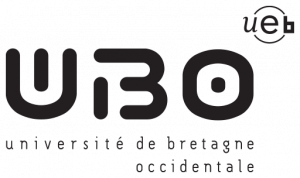
Created in 1971, the University of Western Brittany (UBO) is a public institution of a scientific, cultural and professional nature. It aims to contribute to the development of research and the raising of the scientific, cultural and professional level of the nation and the individuals who make it up. Its goal is also to contribute to regional and national growth, economic development, the implementation of an employment policy, and the reduction of social and cultural inequalities.
Fundamentally multidisciplinary, the UBO has about 30 research units, half of which are affiliated with a public scientific and technological establishment (CNRS, INSERM, IRD) and/or a public industrial establishment (IFREMER), some of which are associated with a university hospital. There are four main research areas (Marine Science, Humanities and Social Sciences, Maths/Information and Communication Technology, Health/Agro-Environment/Materials) to which four research institutes are attached, which favours interdisciplinary exchanges and the emergence of innovative research projects. Resolutely focused on innovation and development, research at UBO looks at themes relevant to the problems of modern society, such as health and sustainable development.
The Geoarchitecture Laboratory (UR 7462), which is more specifically involved in the RES URBANAE project, was created in 1982. It is characterised by its disciplinary, methodological, geographical and biogeographical complementarity, targeting four characteristic geographical groupings: urban areas, ordinary natural areas, protected natural and semi-natural land areas, and areas where land and sea meet. The research developed within the Geoarchitecture Laboratory focuses on practices of transformation of space but also on the doctrines, paradigms, ideas and theories that underlie these practices. This orientation has led to the creation of observation, analysis and evaluation tools, as well as to the examination of theories, discourses and representations. The team members represent the major part of university sites in the Brittany region: Brest, Lorient, Quimper, Vannes. The team’s overall research project is based on two major related and multidisciplinary themes – “Dynamics and Structures of Territories” and “Invention and Management of Heritages” – to which is associated an intersecting and shared theme, “Practices, Uses, Trajectories and Representations”. Guided by a commitment to a multidisciplinary approach, the team focuses on transferring methods and skills to the territory’s stakeholders and sharing the fruits of its research through scientific publications and pragmatic expertise (dissemination and transfer). Five Master’s courses are supported by the laboratory, which also supervises doctorates in its areas of work.
For further information: http://www.geoarchi.net/actu/accueil
